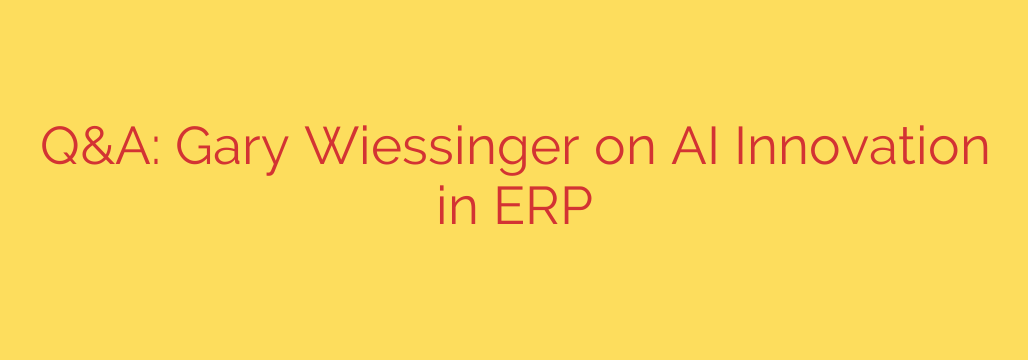
Unlocking a New Era of Efficiency: How AI is Revolutionizing ERP Systems
For years, businesses have viewed their Enterprise Resource Planning (ERP) systems as the central nervous system of their operations—a reliable, if sometimes complex, hub for managing everything from finance to supply chain. But a powerful new force is transforming these systems from passive record-keepers into proactive, intelligent partners: Artificial Intelligence.
AI is no longer a buzzword from a distant future; it’s a practical technology being embedded directly into the core of modern ERP platforms. This integration is fundamentally changing how companies operate, make decisions, and gain a competitive edge. By leveraging the vast, high-quality data already stored within an ERP, AI can uncover insights, automate complex processes, and empower employees like never before.
Why ERP is the Perfect Foundation for AI
An AI model is only as smart as the data it’s trained on. While public AI tools learn from the vast, unstructured chaos of the internet, AI within an ERP has a significant advantage: it learns from your company’s own curated, contextual, and highly structured data.
Your ERP system is a goldmine of information, containing years of financial records, customer histories, inventory movements, and supply chain logistics. This is the clean, high-quality fuel that powers exceptionally effective AI.
AI models trained on an organization’s specific, high-quality ERP data deliver far more relevant and accurate results than generic models. When an AI understands the unique nuances of your business operations, it can provide tailored recommendations, forecasts, and automations that are immediately applicable and valuable.
Beyond the Hype: Real-World AI Applications in ERP
The integration of AI isn’t about flashy gimmicks. It’s about solving real-world business challenges and driving tangible results across every department.
Intelligent Automation: Mundane, repetitive tasks are prime candidates for AI-driven automation. This includes processes like matching purchase orders to invoices, flagging anomalies in expense reports, and generating routine financial statements. This frees up finance and operations teams to focus on more strategic, high-value work that requires human expertise and critical thinking.
Predictive Forecasting and Analytics: Instead of just looking at historical data, AI-powered ERPs can predict future outcomes. Imagine an ERP that not only tells you what you sold last quarter but also forecasts demand for the next six months based on market trends, seasonality, and macroeconomic indicators. AI enables businesses to move from reactive problem-solving to proactive strategy, helping to prevent stockouts, optimize inventory levels, and identify potential supply chain disruptions before they happen.
A Conversational User Experience: The days of navigating complex menus and running rigid reports are numbered. With AI, employees can interact with their ERP using natural language. A sales manager can simply ask, “What were our top-selling products in the Midwest region last month?” or “Show me all outstanding invoices over 60 days.” This makes powerful data accessible to more users, lowering the barrier to entry and accelerating decision-making.
Smart Content Creation: Generative AI can assist in creating context-aware content directly within the ERP. For example, it can draft compelling product descriptions based on item specifications, write personalized collection emails for overdue accounts, or generate initial drafts for job requisitions based on departmental needs.
Your New Strategic Partner: The AI Co-pilot
A common fear surrounding AI is that it will replace jobs. However, the most effective implementation of AI in ERP is the “co-pilot” model. In this framework, AI acts as an intelligent assistant, augmenting human capabilities rather than replacing them.
The AI co-pilot handles the heavy lifting of data analysis, pattern recognition, and routine task execution. This provides human decision-makers with a curated set of insights and recommendations. The final judgment call, however, remains in human hands. The goal of AI in ERP is not to replace human decision-makers, but to empower them with faster, data-driven insights.
Key Security and Strategy Tips for Implementing AI in ERP
As you explore bringing AI into your business operations, keeping security and strategy at the forefront is critical.
Prioritize Data Privacy and Security: Your company’s financial and operational data is one of its most valuable assets. It’s essential that this information is not used to train public AI models. Ensure your ERP provider’s AI features operate within a secure, private environment, using your company’s data only for your company’s benefit.
Start with a Clear Business Problem: Don’t adopt AI just for the sake of technology. Identify specific pain points in your organization. Is your month-end close too slow? Are you struggling with inaccurate inventory counts? Start with a clear objective and apply AI as the solution.
Ensure High-Quality Data: The principle of “garbage in, garbage out” is especially true for AI. Before deploying advanced AI features, invest in cleaning and organizing your ERP data to ensure it is accurate, consistent, and complete.
The fusion of AI and ERP marks a pivotal moment in business technology. It transforms the ERP from a system of record into a system of intelligence—a proactive engine for growth and efficiency. Businesses that embrace this evolution will be better equipped to navigate challenges, seize opportunities, and lead in an increasingly data-driven world.
Source: https://datacenternews.asia/story/q-and-a-with-gary-wiessinger-innovation-in-erp-ai-is-front-centre-and-sides








